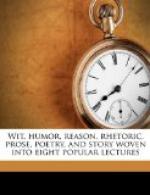Why was it better? At the Chautauqua I was trying to entertain and instruct an intelligent audience. Within the grey walls of that prison I was reaching down to the very depths, endeavoring to lift up human beings, marred and scarred by sin and crime, but dear to the mothers who bore them and the Savior who died for them.
If I were a preacher in New York City and were announced to preach a sermon on home missionary work I would not go to the church by way of the mansions of the rich where children, shod in satin slippers dance and play over velvet tapestry, but by way of the slums where I would meet the children of misery, where,
“To stand at night ’mid the
city’s throng,
And scan the faces that pass along,
Is to read a book whose every leaf
Is a history of woe and want and grief.
As in tears of sorrow and sin and shame,
You read a story of blight and blame,
Your heart goes further than hand can
reach
And you feel a sermon you cannot preach.”
Whoever would prove worthy of the platform must have a message and give to it the devotion of mind, heart and conscience, no matter whether his purpose is to convince by reasoning, convert by appeal, delight by rhetoric, or cure melancholy by humor. Each has its useful influence on the platform.
Some persons have an impression that the student deals in logic, while the orator simply starts his tongue to running, and goes off and leaves it to work automatically.
Bishop Robert McIntyre was one of the greatest pulpit orators of his age, yet I dare say this gifted man gave as much time and thought to his famous word painting of the Chicago fire, as Joseph Cook ever gave to mining any treasure of thought he laid upon the altar of education.
I know many teachers of oratory say: “Study your subject, analyze it well, and leave words to the inspiration of the occasion.” But suppose when the occasion comes, instead of inspiration one has indigestion, then what?
While a speaker should not be so confined to composition that he cannot reach out after, and cage any passing bird of thought, yet as the leaf of the mulberry tree must go through the stomach of a silk-worm, before it can become silk, so climaxes should be warped and woofed into language before they can be forceful and beautiful.
At the Lincoln, Nebraska, Assembly some years ago a noted humorist gave an address on the “Philosophy of Wit.” He called oratory a lost art, and to prove his contention he quoted from William Jennings Bryan’s famous Chicago convention speech. He said: “What would a young woman think of her lover who would say ’My darling, the crown of thorns shall never be pressed down upon your fair brow?’” The humorist expected applause but it failed to materialize, for Mr. Bryan is highly respected in his state and his oratory is a charm wherever he is heard.
The speaker not only exhibited poor taste, but his wit was pointless, for when a man can go before a convention of fourteen hundred delegates and by one burst of eloquence capture the convention, secure the nomination for the presidency, and then with the press and the leaders of his party against him go up and down the country, and from the rear of a railroad train, almost capture the White House, the day of oratory is not gone by.




